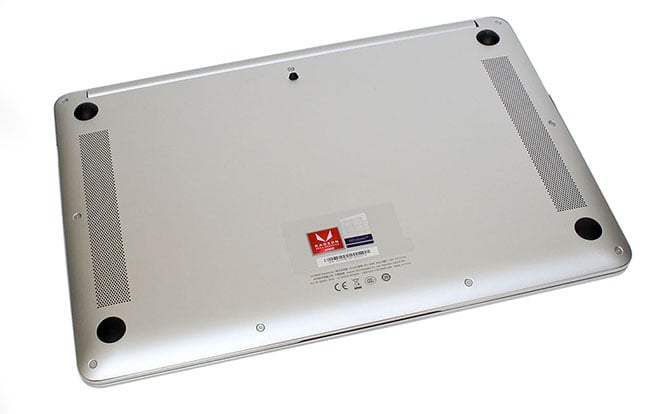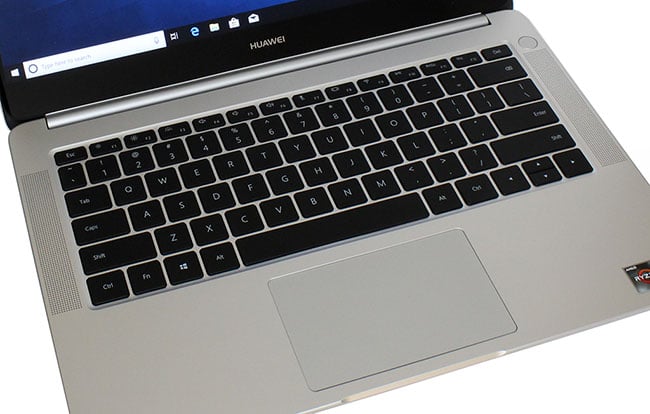The Huawei MateBook D is a 13-inch laptop that sports a 14-inch display and weighs in at 3.5lbs. The overall dimensions are just 12.72in x 8.7in x 0.62in, making it easy to get from place to place without much of a fuss. The exterior features a solid metal chassis that looks similar to some of the aluminum laptops we have tested over the years. However,
Huawei doesn't advertise the MateBook D as aluminum, however. Instead is just states it features a metallic body with a Mystic Silver color. We don't have specifics on the exact alloy the clam-shell is made from, but it does feel sturdy and it held up to our durability tests quite well.
The base of the MateBook D has dual vents on each side of the chassis and five rubber pads to give it some lift when resting on a flat surface. Under the hood though lies some terrific mid-range hardware. The brain of the system is the AMD Ryzen 5 2500U processor. A 4-core, 8-threaded processor that has a 2GHz base clock and a 3.6GHz Boost clock. The 2500U also comes with AMD's Vega 8 IGP. An integrated, on-processor graphics engine based on the Vega architecture (5th generation GCN) that has 8 CUs, 512 shaders and a max boost clock of 1100 MHz.
Aside from the APU the MateBook D also comes with 8GB DDR4 memory, clocked at 2133MHz, a 256GB SSD and a 14-inch IPS touch screen display. Huawei also managed to fit in a large 57.4Wh battery, that should be able to last for a decent clip between charges -- more on that a little later.
The MateBook D features a 14-inch IPS touch screen display. For a $629.99 laptop we were very impressed with the screen. The colors were vibrant and it offered wide viewing angles. The 5.2mm bezels were also extremely small for a laptop in this price range. Above the display is a front facing 1MP webcam that actually worked very well in our testing.
When it comes to connectivity, the MateBook D is somewhat limited, however, even for a laptop in this price range. On the right side of the keyboard you have a USB port, a HDMI port and a USB-C port. On the left side there is simply one more USB port and 3.5mm stereo jack. We would have liked to have seen some more ports and connectivity, like a LAN port or an SD card reader. On the bright side the USB-C port does open up a fair amount of options and it doubles as a power connector.

(Top: right side. Bottom: left side)
The keyboard will look very familiar if you're a MacBook fan. The key placement is nearly identical, as is the large track pad. We have to admit though, we couldn't find any fault with this. They layout was extremely comfortable and the keys were very responsive. We actually found very little to dislike when it came to the design of the keyboard. The same can be said for the track pad. Every movement of our finger was tracked to perfection and the left and right side of the tracking pad were easily distinguished, even without physically-separate left and right buttons.
The speakers are located on each side of the keyboard and feature a Dolby ATMOS Sound System quad-speaker design with split frequency setup. This allows the speakers to flow above and around you for an immersive experience. As with all laptops though, the maximum output will be limited by the relatively small drivers. In our testing we found the speakers to be lacking any real bass and on the thin side, which is par for the course in this space. Dolby ATMOS enhances the output at the software level, but it in some instances made the audio sound slightly distorted.
The keyboard has backlighting, but it's not very bright. As you can see from the two images below. The keys don't get all that much brighter, even when the lighting is on the highest setting. It does make the keys visible in a dark room, but we would've liked to have seen just a bit more light coming through. On the plus side there was very little backlight bleeding on the sides of the keys.

Next we are going to take a look at the software included with the Huawei MateBook D and then we will move on to the performance.











